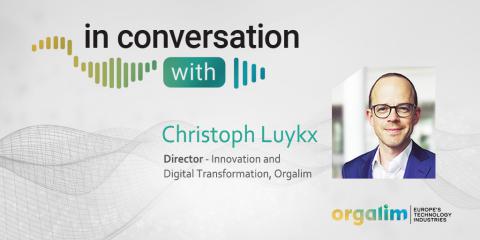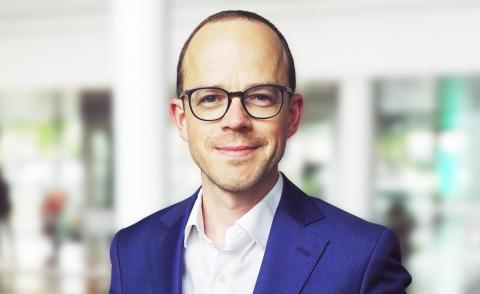In conversation with Christoph Luykx
11 July 2019

In June Orgalim announced the creation of a new Innovation and Digital Transformation team. At the helm is Christoph Luykx, who has joined Orgalim as a Director – bringing with him extensive experience in the digital sector gained at companies like Intel and CA Technologies. Here, he talks to us about the state of play in EU digital and innovation policy and shares his team’s priorities as Brussels gears up for the next legislative period.
You joined Orgalim a little over a month ago – what are your first impressions of the role of digital and innovation in Europe’s technology industries?
Having worked in the digital arena with clients from a range of sectors, I arrived at Orgalim with an understanding of the transformative impact of digital tech. In my new role it has been fascinating to see this from a different perspective: not just how digital transformation is unfolding in Europe’s core industrial base, but how these companies are themselves driving digital innovation across industries. I’m excited to be a part of a great team working to shape an EU framework to unlock the full potential of this evolution.
What was behind the decision to create an Innovation and Digital Transformation team at Orgalim – and why now?
Orgalim has been working on topics like digitalisation, data and R&I for some time. Yet in recent years the accelerating pace of digital transformation has gone hand-in-hand with a growing recognition among policymakers of the cross-cutting impact of digital tech and innovation. So two things became clear: internally we needed a coordinated approach to bring these strands together, while externally we needed to be more visible on this key issue for our industries. Our new team delivers on both counts – and as the EU embarks on a new legislative period, the timing is right to put it in place.
What concrete issues will your team be working on?
On digital, we will continue engaging on the issues where Orgalim has been very active: from artificial intelligence (AI) to cybersecurity to the data economy. And then there are topics that are not new but are increasingly critical for our industries – think 5G, IoT, big data… Looking at innovation more broadly, EU R&D&I programmes will be a key focus, particularly as Horizon Europe gets off the ground.
Zooming in on digital policy: as the Juncker Commission bows out, how would you rate their performance over the last five years?
I would give them a solid four out of five. They sent a strong signal by putting digital high on the agenda and creating a Vice President for the Digital Single Market. Many initiatives were introduced within this framework, not all of them fantastic, but taking a project approach to this key priority was a positive development.
Looking forward, what three issues do you expect to dominate the digital policy agenda in Brussels once the new Parliament and Commission are in situ?
First off, AI will remain a hot topic. It’s interesting because looking at the business reality, AI is not something new; technologies like machine learning have been around for decades. But as the speed of AI development ramps up, it has shot to the top of policymakers’ agendas.

A second key question will be how digital policy fits in to the overarching industrial policy agenda. Digital innovation is central to industrial competitiveness, but will it remain a separate Commission portfolio or be further integrated into the industrial policy discussion?
And thirdly, we can expect growing debate on competition law in relation to certain tech industry players. All eyes will be on how these developments might impact industry more broadly.
From where we stand now, what are the three big digital policy asks Orgalim will put forward in the coming legislative period?
As we advocated in ‘2030: an industry vision for a renewed Europe’, it is time for the EU to embrace the innovation-led transformation of our industry and beyond. This means first helping Europe remain at the cutting edge of new technologies by putting the right policies in place. Whatever decisions you take regarding regulation around digital issues, don’t act too hastily – ensure proper evaluation of existing legislation and consult with stakeholders beforehand.
Second, we need to create a future-proof EU data framework that drives industry’s transformation while respecting fundamental rights and intellectual property.
Third, it is essential to fast-track the Europe-wide roll-out of first-class communications networks, such as 5G and fibre optics, to create a Gigabit Society.
Your team’s remit includes not only digital transformation, but also innovation more broadly. How do these two areas interact?
Digital is cross-cutting and many of the exciting developments in our sectors result from what you would call digital innovation. Yet innovation goes far beyond digital transformation alone. It is firmly rooted in the DNA of our industries, driving their activities more broadly – whether building new business models, rethinking systems like energy or transport, or uncovering new ways to strengthen sustainability.
So what can policymakers do to support this kind of innovation?
As so often, the answer will lie in the right combination of policies. Looking at the innovation cycle, a crucial role is played by the funding companies need for applied research. But often the real challenge lies in development and deployment – in bringing research results to the market. This is why the focus on applied collaborative industrial research will be vital in the future Horizon Europe programme. Beyond funding, another key issue for innovation is skills; not only research or digital skills but also the business know-how to take something from the R&D phase and make a business case around it. This is a discussion that is only going to grow in importance.
Achieving these priorities will require close collaboration between industry and policymakers – what will be the key to successful engagement?
I think our work in the Commission’s High-Level Expert Group on AI is a good model: bringing together different stakeholders – academics, NGOs, industry, policymakers; listening to each other; working together to reach balanced conclusions. Orgalim brings to the table the perspective of a broad cross-section of industry, in particular a B2B viewpoint that is sometimes overlooked. I hope we will uphold and build on this mode of collaboration going forward.